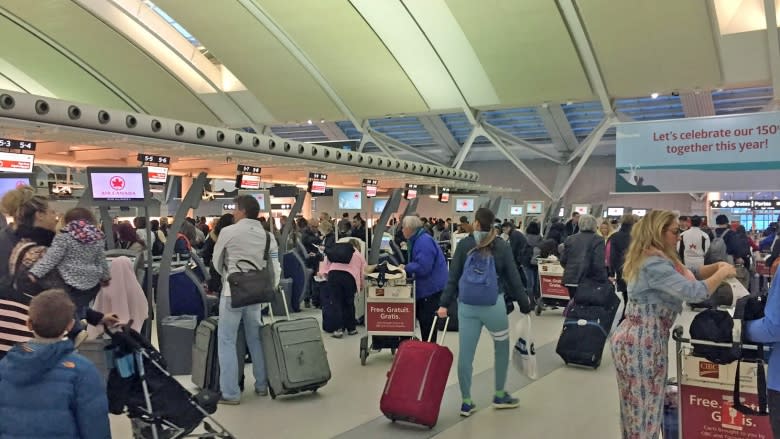Winter weather leads to hundreds of cancellations at Pearson
More than 30 per cent of departing flights were cancelled at Pearson airport Tuesday, thanks to the return of winter weather on both sides of the border.
While the weather has largely tapered off, snowy conditions affected more than 280 departing flights and around 260 arriving flights.
Many of the cancellations were because of stormy locations along the eastern seaboard, said Shabeen Hanifa, senior communications official with the Greater Toronto Airports Authority (GTAA).
The airport recommends checking flight information online as there may be additional cancellations and delays.
There are also some cancellations and delays reported at Billy Bishop airport, which recommends travellers check their airline for their flight status.
Much of Toronto woke up to a blanket of snow on Tuesday. Environment Canada now classifies the conditions as "light snow," with periods of snow and blowing snow continuing overnight. Winds are expected to gust to 60 km/hour and there's a low of -11 C.
The winter weather continues into Wednesday, with periods of light snow throughout the morning, then a mix of sun and cloud. Winds are expected to gust to 70 km/hour. There will be a high of -3 C.
Universities, colleges closed
However, southwestern Ontario experienced much heavier snowfall than the GTA. Environment Canada continues its winter storm warning for the Niagara region, with up to 30 cm of snow expected by Wednesday morning.
Various university and college campuses throughout the Golden Horseshoe also closed Tuesday, including McMaster and Brock universities and Mohawk, Niagara and Sheridan colleges.
Transit delays in Toronto
The City of Toronto salted expressways and roads Monday night, and again Tuesday morning, because of the snowfall.
According to the GO Transit Twitter account, there were some GO bus delays due to the weather and crashes.
Metrolinx spokesperson Anne Marie Aikins said crews worked "around the clock" to minimize any weather-related service disruptions.



